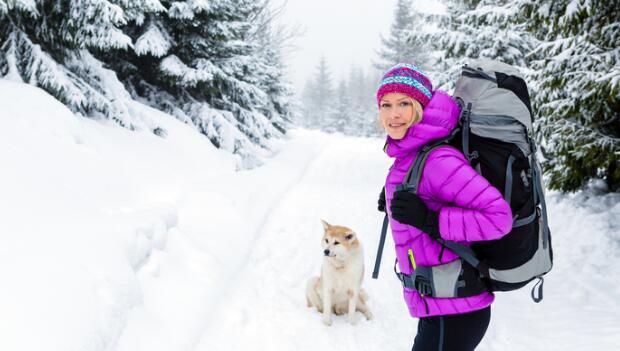
Summer hiking is a blast--sunshine on your face, a warm breeze blowing through the trail--but wintertime creates its own magic within the mountains, especially when there's snow on the ground.
If you've never been, or even thought about hiking in in the offseason, here are five reasons to think again.
Solitude
Popular hiking destinations attract crowds in the summertime, but not in the winter months. "The conditions cull the crowds," says Anderw Skurka, author of The Ultimate Hiker's Gear Guide and an instructor of learning-intensive backpacking courses. Parks or open spaces that once teemed with families or college kids on break suddenly offer a quiet place for reflection.
A New View
Snow dramatically changes your favorite trails and adds novelty to places you've been before. "It's a totally different experience in terms of the senses," says Skurka, from what you smell -- pine becomes more intense in the winter -- to what you see. Instead of wildflowers and green meadows, snow covers everything, even the trail.
That said, be careful if that well-worn path is hidden and clear landmarks are few and far between. You might need to brush up on your navigation skills so that you don't get lost.
More Places to Explore
In the snow, you can strap equipment on your feet and explore the wilderness in a whole new way. You'll expend about the same amount of energy snowshoeing as hiking Skurka says. Although you will go slower, so take that into account when planning your mileage.
With the right equipment, you can also head off the beaten path. Skurka suggests using cross-country skis for flat areas. These skis tend to be skinny and lightweight, and the boots are so comfortable you can move easily in them. "It's a lightweight setup, and it's really pleasant," he says. Unless you're a really good skier, Skurka advises against going downhill.
New challenges
"The wintertime demands a different type of performance than the summertime," Skurka says. And it can bring new challenges in terms of skills and gear. If you enjoy learning new things, then you'll like this aspect of hiking in the winter.
Skills like how to read a topographical map are important in winter if you plan to hike in the open forest and you can't see the trail. You can also learn winter-specific survival skills, like how to melt snow and keep it from freezing, or basic avalanche safety if you plan to explore the backcountry.
No Bugs
If you hate using Deet products to keep the mosquitos from sucking your blood in summer, you'll love giving your skin a break in winter. One thing's certain in the snow, you don't have to worry about bugs while trekking through a winter wonderland.
One More Bit of Advice From Skurka
Even though you don't always feel thirsty, you need to drink a lot of water when hiking in the winter, Skurka warns. The air is a lot drier, and it sucks a lot of moisture out of you. "Your warmth depends on the thinness of your blood," he says. "If you're dehydrated, your blood doesn't flow as well. So, if you're hydrated, you'll actually end up staying warmer."
 Book your next hiking trip
Book your next hiking trip


